Navigating Change
Successful alumni career shifts showcase versatility of a Trinity liberal arts education
By Kathy Andrews

Regardless of how many years have elapsed since Commencement Day, the career paths that Trinity alumni once envisioned ’neath the elms are likely to change direction, at least in small ways if not momentous ones. As we close out the Bicentennial year, the Reporter spoke with alumni about career transitions and the ways in which their liberal arts education—comprising a wide variety of academic disciplines—helped facilitate their professional journeys.
Choosing paths
Long before arriving at Trinity, Celia Rodriguez ’08 anticipated medical school in her future. Of growing up in El Paso, she says, “In my Mexican American family, becoming a doctor was the epitome of success.”
So it makes sense that Rodriguez was thinking about her potential career as soon as she started at Trinity. Biology, calculus, chemistry, and an Interdisciplinary Science Program seminar filled Rodriguez’s first Trinity semester. “I had always excelled in high school and heard ‘you’re so good at math and science.’ ” But upon failing her first exam in biology—her intended major—her heart sunk. She regrouped with Alison Draper, director of the Center for Interdisciplinary Science. “Alison was there to catch me and say, ‘Alright, next semester let’s ease up a little bit.’ ”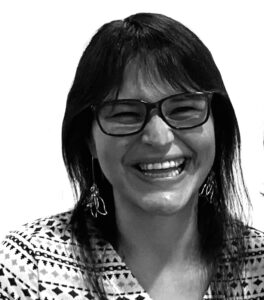
Trinity’s Human Rights Program also interested Rodriguez—in fact, the strength of the program was one of the reasons she decided to attend Trinity—and she began taking classes in that area, finding them fascinating. Junior year, she chose human rights-affiliated study away in Chile, which led her to pivot to an interdisciplinary major in human rights studies with a focus on health care. She loved living in another country and culture so much that after graduation she taught English in Japan for two years.
Upon returning home, Rodriguez began working for health care organizations in El Paso, where she found her niche in social work. She earned two advanced degrees from the University of Texas, a master’s in social work and an M.B.A. Today, she runs the Social Services Department at Bienvivir All-Inclusive Senior Health, overseeing a large group of social workers, licensed professional counselors, social work clerks, and chaplains.
Rodriguez tells current college students, “If you find a class that you’re really interested in and it sparks something in you, then chase that spark and find a way of making a living out of it.” Deciding not to pursue a medical career was difficult, she says, “but Alison helped me see that I was choosing a path more aligned with what I truly wanted for my life.”
Messaging with meaning
After graduating with majors in studio arts and political science, Jay Sidebotham ’76 wanted to live in Manhattan but was unsure about his career aspirations. He had always been skilled at drawing 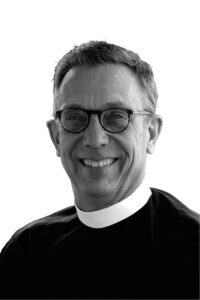 and cartooning, so he decided to follow his father’s and grandfather’s footsteps into the advertising business. Eight years later, his animation work on the television series Schoolhouse Rock! had received acclaim, and, he says, “In advertising, I was paid more than I deserved.” But amid that success, he quit to begin seminary study.
and cartooning, so he decided to follow his father’s and grandfather’s footsteps into the advertising business. Eight years later, his animation work on the television series Schoolhouse Rock! had received acclaim, and, he says, “In advertising, I was paid more than I deserved.” But amid that success, he quit to begin seminary study.
“I just had a deep desire to study more about theology,” says Sidebotham, who worshiped during college at Trinity’s Chapel, a place he says “touched my heart and
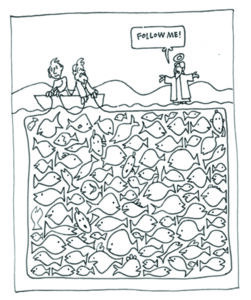
moved me, in deep ways.” Studying at Trinity’s Rome Campus also was a formative experience. “It was really edifying in terms of my interest in art and, on a broader scale, with all the history and political science, Rome was a highlight of my life. Some of my best friends are from that program.”
Ordained as an Episcopal minister in 1990, Sidebotham has served churches in five states and now works half time as associate rector of St. James’ Church in New York City. He also founded the RenewalWorks ministry, which advises congregations across the country on strengthening their spiritual growth, and he published a book—Signs of Life: Nurturing Spiritual Growth in Your Church—that draws lessons from that work.
As a cartoonist, he notes that his hero is Charles Schulz, who said, “Cartooning is preaching.” Sidebotham concurs. “A lot of what I learned as an art director working with a copywriter was about messaging, and I think I have carried that over to what I do in the church.”
He aims to retire from rectoring within a year to spend more time with family and on his painting, a realm in which his heroes include Winslow Homer, Edward Hopper, and Richard Diebenkorn. “Life is full,” says Sidebotham. “I feel it’s such a privilege because I don’t know many times in my life when I’ve been bored.”
A better fit
As an English major, Thomas Hunter ’80 loved studying Faulkner and Hemingway and rowing on the crew team. Today, as manager of case management at Chicago House and Social Service Agency, he supervises nine case managers, serving clients who are HIV-positive or have AIDS. It is challenging, meaningful work and worlds away from where he began his career after Trinity.
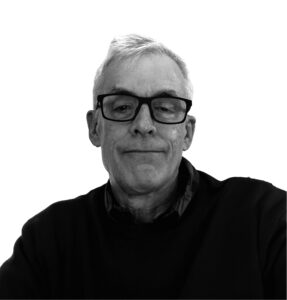 During college, Hunter landed a summer job in New Jersey, his home state, at a research company, leading to a position after graduation with an advertising research firm. He earned an M.B.A. at New York University’s Stern School of Business and shifted from research to branding, overseeing elements such as packaging, promotions, and advertising for accounts including chewing gum and writing instruments. After more than two decades, he still enjoyed the work, but when his employer’s business foundered in an economic downturn, he was laid off. While mulling over next steps, Hunter took the Strong Interest Inventory career assessment.
During college, Hunter landed a summer job in New Jersey, his home state, at a research company, leading to a position after graduation with an advertising research firm. He earned an M.B.A. at New York University’s Stern School of Business and shifted from research to branding, overseeing elements such as packaging, promotions, and advertising for accounts including chewing gum and writing instruments. After more than two decades, he still enjoyed the work, but when his employer’s business foundered in an economic downturn, he was laid off. While mulling over next steps, Hunter took the Strong Interest Inventory career assessment.
“My personality really wasn’t the right match for branding. I’m pretty down to earth, a little reserved, and testing suggested a helping profession would be a better fit.” Hunter secured a job as a case worker at a transitional living facility in Chicago. After five years in the field, he realized that to further his career, he should pursue a master’s in social work, which he completed at the University of Chicago. “If you really want to do something, you make it work,” he says.
Reflecting on his Trinity rowing days, including senior year on an undefeated varsity team, he says, “I think it confirmed during college that I am a responsible, determined person with a strong work ethic.” These days, he still rows—on a Concept2 machine at the gym—and participates in grueling bike-ride fundraisers to benefit people living with AIDS. In his job, he says, the most satisfying parts are “helping clients achieve good things in their lives and seeing them improve their situation, and seeing case managers flourish after training and developing them.”
Unconventional superpower
Katie Harte Rosenblad ’08, a biology major, proceeded from Trinity to Boston University for a master’s in forensics, her chosen field. She then worked for the Office of the Chief Medical Examiner in Boston and soon was recruited by the Pathology Department of Boston Children’s Hospital to conduct autopsies. “I was great at the analytical but wasn’t prepared for the emotional toll.” After her position changed to require increased interaction with families of deceased children, Rosenblad says, “I couldn’t do it anymore.”
Today, she is a senior financial analyst with the Walt Disney Company. “Sometimes, careers are not a ladder. Mine was more of a zigzag path.” After leaving the hospital, Rosenblad decided she 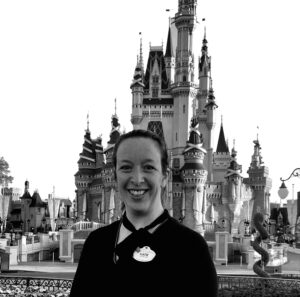 would attend business school. Before her classes began, she found a job at a local mall’s Disney Store. “It was such the mental change I needed of just joy and happiness. I was way overqualified, but I loved it.”
would attend business school. Before her classes began, she found a job at a local mall’s Disney Store. “It was such the mental change I needed of just joy and happiness. I was way overqualified, but I loved it.”
Her Disney experience stuck with her as she headed to the University of North Carolina’s Kenan-Flagler Business School for an M.B.A. While other students prepared for employment at big consulting firms, Rosenblad set her sights on Disney. “They all thought I was crazy.” Instead of a traditional M.B.A. internship, she entered the Disney College Program. “I’ve never been traditional, and I’m not afraid to start at the bottom again and work hard.” In the past decade, her Disney roles have included working at a roller-coaster and as part of a team launching a cruise ship, coordinating training for 200-plus hotel housekeepers, helping open Pandora – The World of Avatar, and analyzing capital projects across the company. Now she’s helping to build a new business, Storyliving by Disney.
At Trinity, Rosenblad first delved into finance while serving as treasurer of Cleo of Alpha Chi, the coed literary society; later she was the group’s president, gaining leadership experience. Besides her focus on science, she took theater classes in stage lighting and set design, costuming, and improv. “I’ve used many of those skills in my career. If anything prepped me for being on opening teams within Disney, where you have to think on the fly, it’s improv.”
“Being unconventional is my superpower,” says Rosenblad. “Embracing that has led to unique and amazing job experiences that otherwise never would have happened.”
‘Cherry on top’
Steve Salky ’76 has practiced law in Washington, D.C., for 35 years, representing executives in federal proceedings. “It was a great career. But I did not want to limit myself for my entire life to one professional activity. I wanted to shift gears and challenge a different part of my brain.”
Members of Salky’s family have worked in health care, inspiring him to want to do the same—particularly to serve low-income patients. After studying and acquiring preliminary credentials, he attended nursing school and became a certified nursing assistant. Now, he volunteers two days a week at a medical clinic at D.C. nonprofit Bread for the City, conducting patients’ initial health 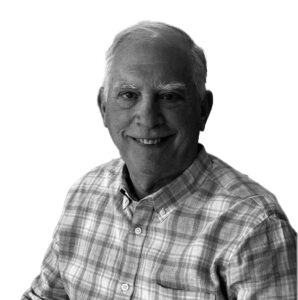 assessments and drawing blood samples, among other duties. He also volunteers one day a week at a hospital mental health ward, spending time talking with people seeking acute care. He still squeezes in time for legal work, too.
assessments and drawing blood samples, among other duties. He also volunteers one day a week at a hospital mental health ward, spending time talking with people seeking acute care. He still squeezes in time for legal work, too.
A history major, Salky recalls a favorite Trinity hangout was the library, where he would read for hours. “Trinity [also] was very flexible. I could do things that I wanted to do in the community, and Trinity would support me. The stimulation I received in the classroom led me to explore all sorts of other interests of mine,” he says, including attending the London School of Economics his junior year. In Hartford, he was energized by tutoring children at the Charter Oak housing project and interning with the state public defender’s office and the Hartford Institute of Social and Criminal Justice. After graduation, he worked at the latter, which led him to pursue a Yale University law degree.
“Now I’m a proselytizer for volunteering,” says Salky, a donor to Trinity’s Liberal Arts Action Lab. “I view this part of life as the ‘cherry on top’ portion. I’ve raised my children, I’m still healthy, I have a lovely marriage, and now this is the time to do whatever you want to do.”
For information about career-related resources available to alumni, contact Alumni Career Consultant Paul Gagnon M’01 ([email protected]), whose bio on the Career and Life Design Center website describes his professional background as “four careers rolled into one.” To schedule a career consulting appointment with Gagnon, log in to Handshake online platform, Trinity’s careers portal, using your Trinity credentials to log in. (For alumni who are not familiar with Handshake, or if you are having issues accessing or logging in, please contact [email protected].)
More stories about career transitions
Levi Litman ’98
“I was an economics major and modeling and data minor at Trinity. After graduation, I worked for a start-up internet company, an investment bank, and then a strategy consulting firm. After September 11, 2001, my consulting firm lost many of its clients as their demand for consulting services came to a halt. Rather than staring at my computer (since we had no consulting projects), I attempted to strum up new business by joining the sales team. With that also being fruitless, I started to question why I was sitting behind a computer screen all day. I decided that I wanted to do something more service focused and help people (kids) who needed help. I was accepted into many teaching programs and ultimately decided on the New York City Teaching Fellows (very similar to Teach For America) because I wanted to teach students in New York City, and this program gave me the opportunity to be a full-time teacher after three months of intensive teacher training. My liberal arts education at Trinity was valuable as I was accepted at all of the top colleges (BC, NYU, Teacher’s College Columbia, Bank Street). At Trinity, I had good relationships with a few professors, and they wrote great letters of recommendation for me. One of my education classes had us volunteer/tutor at Betances Elementary School in Hartford. It was a great experience not only tutoring but also being a big brother/role model for the kid that I worked with. It planted the seed in my mind that teaching could be in my future. My coursework from Trinity also allowed me to pursue my master’s in math education even though I did not have a math major. . . . I love both Trinity and my job as a math teacher.”
Rick Dubiel ’77, P’06
“I graduated from Trinity in 1977 with a double major in psychology and English. (I used to be a reporter for the Tripod, too!) I made several career changes in my professional life, and the liberal arts education provided at Trinity helped me immensely. As a psych major, I unsuccessfully applied for admission to clinical psych grad schools, which is more selective than med school. So I started out in the field of counseling and social work. I didn’t see much financial future there, so I made a career change into computer programming, which was more remunerative. Along the way, I picked up an M.P.H. degree and transitioned to clinical project manager work, then became a lead director for a managed care company. Thanks to Trinity, my writing skills were superior to that of the medical directors I worked with, and thanks to Trinity, I was able to make persuasive arguments for many money-saving initiatives.”
Deb Smith Arthur ’88
“I practiced criminal defense and juvenile law for 10 years and then I shifted to academia. I am a professor at Portland State University and the founding director of the Higher Education in Prison Program at PSU.”
Dyke N. Spear Jr. ’57
“On September 1, 2023, I shut down my solo law practice that I had maintained and promoted for 63 years. During these 63 years, I handled over 2,000 legal matters. Some were relatively small, others attracted media attention including front-page newspaper coverage.
“In April of 1961, I launched a parallel show business career as a concert and theatrical impresario throughout the United States and Canada, presenting such artists as Ray Charles, Simon & Garfunkel, Maurice Chevalier, The Righteous Brothers, Louis Armstrong, and many more. Additionally, we went into over 300 cities with 20 different Broadway productions, including A Chorus Line, My Fair Lady, Grease, Hair, 42nd Street, and 15 more.
“The 130-city tour of Oh! Calcutta!, the most controversial show in American show business history, set off a firestorm of controversy because of its nudity and subject matter. We went into litigation in 29 of the 130 cities. There were warrants for my arrest in Atlanta, Georgia, and Fort Smith, Arkansas. We never lost a case, and I was never arrested.
“When show business activities petered out, I put together a lecture on the UFO phenomenon and booked myself into 55 cities, going as far west as Aspen, Colorado. The lecture tour was the product of the lecture I did for my 50th Reunion in the physics auditorium. It attracted a capacity audience and was the best attended of the nine lectures presented that weekend. Because of the feedback received from my classmates and others, I became motivated to lecture around America.
“I credit Trinity with nurturing my ability to always be self-employed and entrepreneurial and to enjoy three different career opportunities. The law practice and my lectures paid the bills. Show business made my fortune. It was never easy. If it was easy, everybody would do it.
“My life was always exciting and very rewarding in that I was able to do some charitable things and bring enjoyment to over 1½ million of my audience patrons. To Trinity I will always be grateful for the opportunities granted me by my Trinity education, Phi Kappa Psi experience, and extracurricular activities in which I participated.”
Carl Zimmerman ’61
“Today’s e-newsletter asked that question [Did you change your career path?], prompting me to write to you because my answer is ‘yes.’
“My freshman English instructor and adviser, George Nichols, gave me an excellent bit of advice. He pointed out that if I intended to go to graduate school, I would then be focused entirely on my subject of interest, so I should take advantage of my undergraduate years to get the broadest possible education. I took that advice, minoring in physics in order to take the minimum necessary number of courses in mathematics, my major field. Otherwise, I hit almost every department—a year of chemistry, a year of geology, a year of economics (with N.X. ‘Jack’ Oanh), a semester of psychology, a semester of harmony (with Clarence Watters, who also directed the Chapel Choir in which I sang for four years), the required year of freshman English (with guest appearances from John Dando), a year of engineering drawing, a semester of religion, etc. The only department that I avoided was history, which I actively disliked at the time; that’s rather ironic, considering that I am now a historian of sorts. My grades were respectable, but not outstanding.
“Singing in the Chapel Choir provided a bit of pocket money (25 cents each for two rehearsals a week, 50 cents each for two Sunday services), as did working in the darkroom for the PR office making photographic prints. I learned to play the carillon and was assistant carillonneur of the College for three years; that field is still an important part of my life. I also played flute in the marching band directed by Willard Green, whose name doesn’t even appear on the College website, though we played at halftime for most football games. But I didn’t join a fraternity, and wasn’t a particularly social person.
“Looking back on my college experience from a perspective of more than 60 years, there is only one course that was vitally important in itself—a semester under Dr. Edmond La Beaume Cherbonnier, titled ‘The Judeo-Christian Origins of Western Culture.’ Although it was taught from an academic perspective, it had for me the benefit of resolving my intellectual confusion regarding Christianity so that I could settle firmly into a lifelong journey of being both a scientist and a churchman. The other courses provided me with a breadth of knowledge and a habit of clarity of thought that have served me well in all aspects of my subsequent life.
“That’s the foundation, or starting point; but what about the career path? I did go on to graduate school, in mathematics, which incidentally provided me with exposure to some of the earliest commercial computers but did not result in a degree. (That’s a different story for another day.) Consequently, I lost my draft deferment while the country was in the midst of the Vietnam War. But I was able avoid the draft because the U.S. Air Force looked at my math/physics background and offered to make me a weather officer. That became my first career, but only because the computer experience led me into a series of highly specialized meteorological jobs. Even though the USAF eventually sponsored me for a master’s degree in atmospheric science, by the time I retired (with the rank of major), I was a far better computer systems analyst than I was a meteorologist, so that became my second career. I then worked in an agricultural research center, in the U.S. Army program office for the Apache helicopter, and in the computer center of a large bank.
“Looking back on almost 40 years of highly varied jobs that I held during my military and civilian careers, it seems to me that what Trinity did for me was to prepare me for a life of continual learning. In none of those jobs was I totally prepared to hit the ground running on day one, but I quickly learned my way into each job and became fully productive within a very short time. Long ago I decided that the day I stopped learning would be the day I started dying, and I’m not yet ready for that. Now into my ninth decade, I’m still busy expanding a website that is a resource for people all over the world, and I’m still singing in my church choir and the St. Louis Symphony Chorus. Although I have lost my dear wife of 55 years, I am still involved with our children, grandchildren, and other relatives. And as long as my health holds up, I expect to continue to do so.
“Thank you, Trinity!”
Which class/professor changed the trajectory of your life?Clay Siegert ’96Professor Cindy Butos was my freshman seminar instructor (“Protest Literature of the 19th Century”) way back in the fall of 1992. Her impact on me all started with a C-minus grade on my first college paper in that class. (Yikes!) After that poor grade, I realized I must step up my efforts to become a better writer . . . and thankfully Professor Butos committed to guide me. Over the course of my freshman seminar—and then later as a mentor for me when I was a writing associate in the Writing Center as a junior and senior—I developed writing skills that served me well at Trinity and later in my career as an entrepreneur. Thank you, Professor Butos! Tracy (Newman) Benham ’81I’d like to honor two professors from my time at Trinity: economics professor Diane Zannoni and mathematics professor Robert Stewart. They were both excellent teachers, but more so, they were kind and patient and truly cared about their students. When I decided to go into education, they were two of my role models on how I wanted to be for my students. Maura Griffith ’17Recent Ph.D. recipient, UCL Institute of ArchaeologyAnyone who knows me would tell you that I am not a quiet person; I tend to walk into a room voice first. I fully acknowledge that that’s not everyone’s cup of tea. Despite initial reservations about my chattiness and general volume level, doc (specifically not capitalized; Craig Schneider) took me on as a research assistant in his lab. I worked in doc’s lab for three semesters, plus occupying an honorary research desk (next to my buddy, Paco the corn snake) while working on my senior thesis in classics. At a period of time when I felt most adrift on campus, having a space in the lab that was my responsibility helped me to ground myself. |
Advice for students, other alumni
Celia Rodriguez ’08
“Take advantage of the career center and of the mentors you have at Trinity because you don’t realize how much support we [students] have until we’re not there anymore. Make decisions based on what you want to do, but know that you’re going to make mistakes, and it’s still going to be OK.”
Jay Sidebotham ’76
“I’ve found it’s important to do what you love, what feeds your spirit, what gives you energy—to do what moves you. In my experience, there are ways people reinvent themselves at all different kinds of stages, and keeping yourself open to that possibility is helpful.”
Thomas Hunter ’80
“I would recommend vocational testing—Myers-Briggs and especially the Strong Interest Inventory assessment. Also get out and talk to as many people in as many different fields or careers that might interest you. Do informational interviews either by phone or in person, and see what they have to say. Hear how they describe it, how they got into it, what they like about it, and any tips they may have for someone just getting into it.”
Katie Harte Rosenblad ’08
“When it comes to deciding on a major, it’s not the be-all and end-all, and it’s not going to be a straight line, and that’s OK. It makes it way more creative and fun. The other piece of advice is, in general, don’t knock it till you try it. There may be opportunities that present themselves that maybe don’t sound appealing, but unless you try it, you’ll never know. Maybe you’ll find a new favorite thing. Just try it, and maybe that’s the skill set you were missing. Or you might have found your new passion, but you’re not going to know unless you try.”
Steve Salky ’76
“My greatest piece of advice would be ‘don’t limit yourself to the classroom.’ Go do things outside, and you will learn more in the real world and how to function in the real world that will serve you throughout your life in ways that the classroom can’t. I’m a big believer in that, and Trinity was a place where I could do that. Also, if there’s a tangent you’re interested to explore, talk with a faculty member. You might find that a piece of literature leads you down a path that is not related to the specific curriculum in that class, but explore that, take it, and run with it. Don’t limit yourself to . . . the four corners of the syllabus.”
